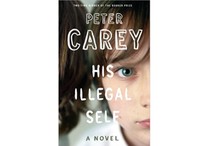His Illegal Self
By Peter Carey
288 pages;
Knopf
With His Illegal Self (Knopf), The Australian-born (and now New York-residing) Peter Carey has written an odd, syncopated, beautiful, and emotionally compelling novel about the child of '60s radicals on the run. The child's name is Che—what else?—but within the narrative he is most often simply "the boy," wearing a namelessness that adds to the reader's sense of his vulnerability and fundamental innocence. He is almost 8 when the story opens, and has been living as a virtual prisoner of his well-to-do grandmother, hardly allowed to leave her Upper East Side apartment, cut off from television and any other news from the outside world that might bring him the image of his famous, fugitive parents. Then one day a woman walks in the door, argues in perfect bitter pitch with the grandmother, and sneaks Che off into the subway system, where no true Upper East Side lady would ever follow. He believes she's his mother; she tells him to call her "Dial." By the time his journey is over, he has landed in a kind of hippie commune in the tropical jungle of Queensland, half a world away. There is in the book a fascinating and deeply intelligent evocation of late '60s, early '70s period detail, in speech, atmosphere, and irrational behavior, but at its core His Illegal Self is an ancient and magnificently eerie fairy tale, about a child wise beyond his years, stolen away to the forest, undergoing every kind of mortal trial, and surviving, in a surprising state of luminous grace.
— Vince Passaro


